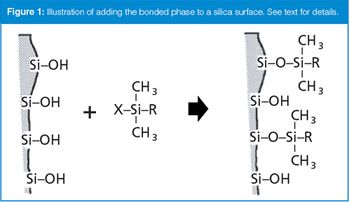
LCGC Europe
The first meeting of The Chromatographic Society’s Diamond Jubilee celebration year will be held at the Institute of Engineering and Technology (IET) in Savoy Place, London, UK, on Tuesday 22 March 2016.

LCGC Europe
The first meeting of The Chromatographic Society’s Diamond Jubilee celebration year will be held at the Institute of Engineering and Technology (IET) in Savoy Place, London, UK, on Tuesday 22 March 2016.

LCGC Europe
Pavel Jandera spoke to Frantisek Foret about building his own liquid chromatograph, the birth of “modern” high performance liquid chromatography (HPLC), the importance of exploring (and understanding) earlier research papers, current trends in contemporary chromatography, and his inspiring advice for aspiring chromatographers.

LCGC Europe
Fluorinated stationary phases, especially those including a pentafluorophenyl (PFP) moiety, have become popular alternatives to the more traditional alkyl (C8 and C18) phases. Many modern column lines have, in fact, been initially introduced with the standard C18 and a PFP phase because of their orthogonality. In this instalment, the differences between alkyl phases and PFP phases are discussed in terms of fundamental interactions. The origin of the interactions is also interpreted to better understand how analysts can use and control them to develop effective and rugged analytical methods.

LCGC Europe
An excerpt from LCGC’s e-learning tutorial on sample preparation troubleshooting at CHROMacademy.com

LCGC Europe
Click the title above to open the LCGC Europe February 2016 regular issue, Vol 29, No 2, in an interactive PDF format.

LCGC Europe
Hydrophilic interaction chromatography (HILIC) was introduced more than two decades ago and has garnered much attention. Characterized by a hydrophilic stationary phase used in combination with an aqueous organic mobile phase, numerous improvements have been achieved and HILIC is now considered as an attractive alternative to reversed-phase phase liquid chromatography (LC) for many applications. HILIC provides several advantages over reversed-phase LC for the analysis of polar compounds, including higher retention of polar metabolites, enhanced mass spectrometric sensitivity, moderate back-pressure - even at high flow rates, or when used with sub-2-µm particle size - and orthogonal selectivity. Several important technical developments have been proposed during the last decade that foster its use in metabolomics. This review presents an overview of the most recent technical improvements and applications of HILIC analysis in untargeted clinical metabolomics and discusses important practical considerations, including the selection of the optimal column chemistry, appropriate eluents, sample preparation, and data analysis.

LCGC Europe
The silica-based packing in reversed-phase columns is not inert. Here we consider what happens when the mobile-phase pH is too high or too low.

LCGC Europe
Data integrity issues are changing the way that we should be undertaking computerized system validation (CSV) of our chromatography data systems (CDSs). Do you understand what is required in the brave new world of CSV?